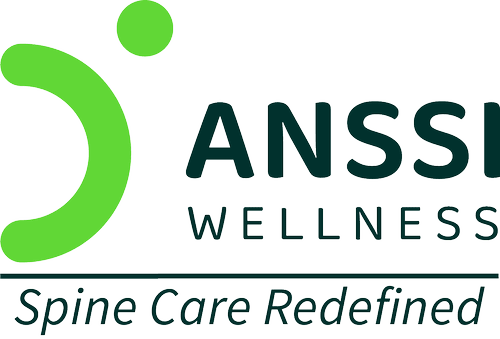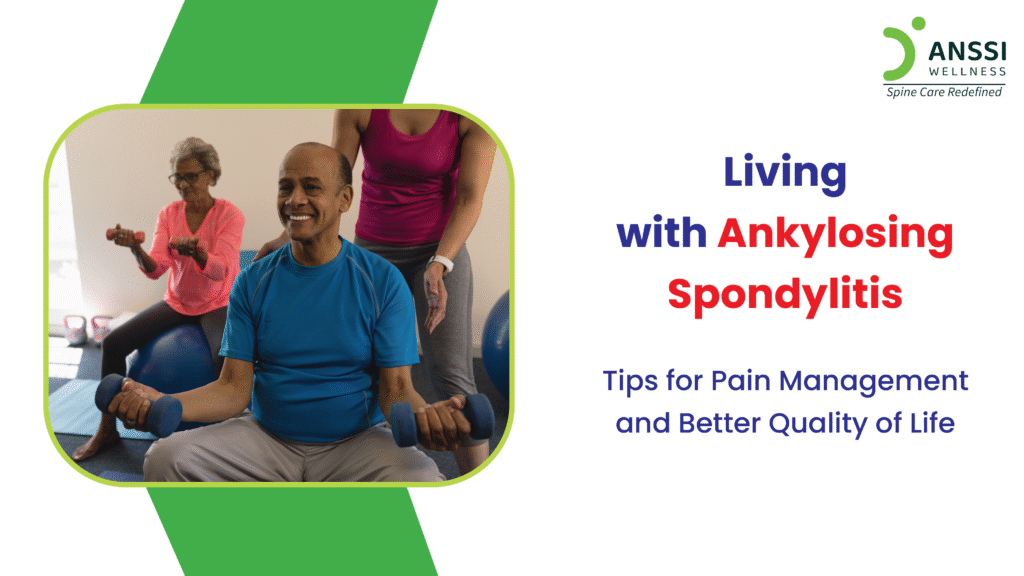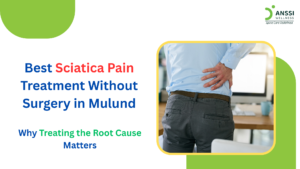Ankylosing Spondylitis (AS) is a chronic inflammatory condition that primarily affects the spine and sacroiliac joints. It often begins in young adulthood and progresses gradually, causing symptoms like deep lower back pain, prolonged stiffness (especially in the mornings), and increasing spinal rigidity.
Though there’s no cure, consistent lifestyle modifications and targeted therapies allow many people to maintain an active, fulfilling life.
Understanding Ankylosing Spondylitis
AS is driven by a genetic predisposition. Many affected individuals carry the HLA-B27 gene combined with an autoimmune process that inflames spinal joints. Over time, chronic inflammation can cause new bone formation, resulting in spinal fusion and reduced flexibility.
Early diagnosis is crucial in preventing irreversible changes such as rounded posture (“hunchback”) or chest wall restriction. A structured treatment plan is essential for preserving mobility, reducing flare-ups, and protecting long-term quality of life.
Effective Pain Management Tips
By blending regular movement, posture correction, balanced nutrition, and targeted care, you can actively reduce pain, prevent complications, and improve your daily life.
1. Regular Low-Impact Exercise
Activities like walking and swimming promote joint mobility with minimal stress on the spine. Swimming, in particular, offers resistance-based exercise that supports muscle strength and spinal flexibility.
2. Physical Therapy
A trained physical therapist can create individualised programs focusing on spinal extension, thoracic rotation, and core stabilisation. This helps correct postural changes before they become fixed deformities.
3. Posture Awareness and Ergonomics
Use ergonomic furniture that supports neutral spinal alignment, especially chairs with lumbar support. Stretch or stand every 20-30 minutes to avoid prolonged stiff muscles. At work or home, maintain an upright posture to counteract AS-induced rounding.
4. Heat and Warmth Therapy
Soaking in a warm bath or applying heating pads can relieve stiffness and enhance blood flow. This home-based method complements daily stretching sessions.
Lifestyle Modifications for Better Quality of Life
Stay proactive, stay supported, and you can live well with AS on your terms.
Balanced Anti-Inflammatory Diet
Adopt a diet high in fresh fruits, leafy greens, fatty fish (rich in omega-3s), nuts, and olive oil. These foods help reduce inflammation. Minimise processed foods, excessive sugars, red meat, and alcohol intake.
Stress Management
Techniques like mindfulness meditation, deep breathing exercises, or gentle yoga, help reduce muscle tension and inflammation. Try guided mobile apps to manage stress during flare-ups.
Adequate Sleep
Choose a medium-firm mattress for proper spinal support. Use a low to medium-profile pillow to maintain neck alignment. Ensure the bedroom is cool and dark to enhance sleep quality.
Avoid Smoking and Limit Alcohol
Smoking worsens inflammation, contributes to osteoporosis, and speeds up spinal damage. Alcohol can interfere with medications. Quitting smoking and reducing alcohol intake aids both spinal health and overall wellness.
Medications
Non-steroidal anti-inflammatory drugs (NSAIDs) are frontline treatments to reduce pain and inflammation. For severe cases, doctors may prescribe disease-modifying medicines (DMARDs) or biologic agents under specialist supervision.
Putting It All Together
- Stay Active: Regular movement is the best defence against stiffness.
- Stay Out of Routine: Counteract posture changes frequently.
- Stay Nourished: An anti-inflammatory diet supports your joints.
- Stay Supported: Lean on therapy, medication, support groups, and regular medical care.
About ANSSI:
ANSSI Wellness focuses on improving the quality of life for patients suffering from spinal issues, aiming to provide relief where other conventional treatments have failed. Through advanced non-surgical spinal decompression treatment, ANSSI is committed to helping patients avoid surgery and recover in a safe, effective, and compassionate environment.
Connect with ANSSI Wellness on LinkedIn, Instagram, and Facebook for expert guidance.



